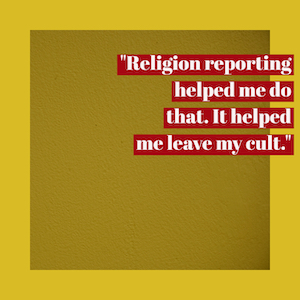I’m often asked why I became a religion reporter.
Last week, I gave a guest lecture in one of Gonzaga’s religion classes. I was asked to talk about the intersection of Christianity and sexuality, but students were instead mostly interested in my career choice.
What’s the most interesting story I’ve written? The most difficult? Why did I want to do this for a living? What’s the state of religion reporting today? What about journalism, in general?
Maybe they were so fascinated because religion reporters are going extinct, so it’s not every day one walks into their classroom. I recently completed an informal survey and found that out of the approximate 1,300 daily newspapers left in the U.S., only about 30 of them have religion reporters.
That wasn’t the case when I first started on the beat. Fifteen years ago it was hard to land a religion reporting position because it was competitive: veteran faith writers wouldn’t abandoned their beat and rookies were chomping at the bit to get in. Now it’s hard to become a religion reporter because the position’s been eliminated.
I told the class I knew I wanted to be a journalist when I was 15 years old, thanks to a great experience writing for my high school newspaper and then landing an internship with the Albuquerque Tribune (now defunct).
It wasn’t until undergraduate school, though, that I learned I could write about religion for a living. I wrote for the university paper, The Chase, and found myself volunteering to cover faith stories – like profiling local clergy, writing about church Christmas pageants, or the town’s first Kingdom Hall of Jehovah’s Witnesses.
A professor noted my interest in theology and introduced to me to the Religion News Association – and thus my religion reporting career began.
My interest in the subject stems from my upbringing, which I’ve written about before in this column. I grew up in a house church, which evolved into a cult. One of the main lessons taught in that group was that all other religions were wrong – even other Christian traditions.

Religion reporting helped me do that. It helped me leave my cult.
My parents don’t read my stories. They never have, claiming that I’m spreading false doctrine.
Nevertheless, for years I covered religion for daily newspapers and got to experience life all across the U.S. But when the paper I worked for in Connecticut nixed the faith section and made me a bureau reporter, I jumped ship. I decided to keep my beloved beat alive by making space for it on the internet, and, in a nutshell, that’s how favs.news came to be.
If you’re not familiar with it, SpokaneFaVS is online publication that covers religion news and offers commentary about faith and ethics issues here in the Spokane area. It’s maintained a quiet presence here in Spokane for more than six years now.
If I hadn’t started this site, I don’t know if I’d still be a religion reporter today. And if I wasn’t a religion reporter, I don’t know if I’d be able to navigate this increasingly polarized society.
I can’t answer the student’s questions: I don’t have a favorite story, nor can I say which one was the most difficult to write. Because in the end, they all help me to learn, to grow, to find compassion.
If everyone who reads and appreciates FāVS, helps fund it, we can provide more content like this. For as little as $5, you can support FāVS – and it only takes a minute. Thank you.
[give_form id=”53376″ show_title=”true” display_style=”button”]








